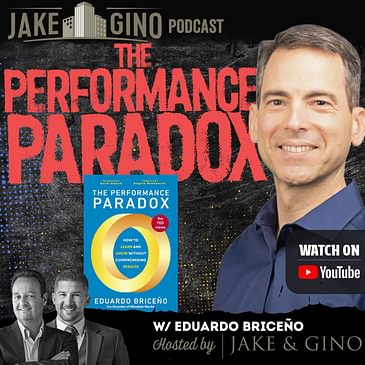In this enlightening episode, host Gino Barbaro sits down with the renowned speaker and growth mindset expert Eduardo Briceño. Together, they explore the transformative power of adopting a growth mindset and how it can unlock your full potential in both personal and professional life. Eduardo shares insights from his latest book, "The Performance Paradox," and delves into the importance of balancing the performance zone with the learning zone to achieve continuous improvement.
Timestamps:
00:00 - Intro
01:39 - Eduardo’s Inspiration for Writing "The Performance Paradox"
04:30 - The Learning Zone vs. the Performance Zone
07:01 - Strategies to Enter the Learning Zone
09:45 - The Role of Mindset in Learning
11:38 - Misconceptions About Learning
13:44 - Gino’s Personal Learning Journey with Opera Singing
21:48 - How Voice Training Improved Gino’s Public Speaking
23:56 - Implementing a Learning Culture in Organizations
28:08 - Overcoming Challenges to Learning in the Workplace
32:54 - Daily Habits to Foster a Growth Mindset
37:48 - Where to Find Eduardo Briceño and His Book
38:19 - Gino Wraps It Up
Key Takeaways:
Discover the difference between the performance zone and the learning zone and how to balance them effectively.
Learn practical strategies to foster a growth mindset and continuous improvement in your personal and professional life.
Understand common misconceptions about learning and how to overcome them.
Gain insights into creating a culture of learning within organizations to promote innovation and high performance.
About the Guest:
Eduardo Briceño is a global keynote speaker who guides world-leading companies in developing cultures of continuous improvement, innovation, and high performance. His latest book, "The Performance Paradox," delves into how we can achieve more tomorrow than today by adopting a growth mindset and learning how to change effectively.
Connect with Eduardo Briceño:
Website: https://Briceño.com
LinkedIn: Eduardo Briceño
Book: The Performance Paradox on Amazon
About the Host:
Gino Barbaro is a co-founder of Jake and Gino, a multifamily real estate education company. He is passionate about helping others achieve their financial and personal goals through real estate investing and personal development.
Subscribe for more inspiring interviews and insights on personal growth and professional development!
We're here to help create multifamily entrepreneurs... Here's how:
Brand New?
Start Here: https://jakeandgino.mykajabi.com/free-wheelbarrowprofits
Want To Get Into Multifamily Real Estate Or Scale Your Current Portfolio Faster?
Apply to join our PREMIER MULTIFAMILY INVESTING COMMUNITY & MENTORSHIP PROGRAM. (*Note: Our community is not for beginner investors) 👉https://jakeandgino.com/apply
About Jake & Gino
Jake & Gino are multifamily investors, operators, and mentors who have created a vertically integrated real estate company. They control over $350M in assets under management. They have created the Jake & Gino Premier Multifamily Community to teach others a simple three-step framework for investing in multifamily real estate.
Connect with Jake & Gino on the social media platform you are most active on: https://jakeandgino.com/link-tree/
#multifamilyinvesting #apartmentinvesting #multifamilysyndication #realestatetrends #investingstrategies #financialstrategies #edwardbriceño #moneymindset #money #performanceparadox
#learningfrommistakes
We're here to help create multifamily entrepreneurs... Here's how: Brand New? Start Here: https://jakeandgino.mykajabi.com/free-wheelbarrowprofits Want To Get Into Multifamily Real Estate Or Scale Your Current Portfolio Faster? Apply to join our PREMIER MULTIFAMILY INVESTING COMMUNITY & MENTORSHIP PROGRAM. (*Note: Our community is not for beginner investors) 👉https://jakeandgino.com/apply About Jake & Gino Jake & Gino are multifamily investors, operators, and mentors who have created a vertically integrated real estate company. They control over $250M in assets under management. They have created the Jake & Gino Premier Multifamily Community to teach others a simple three-step framework for investing in multifamily real estate. Connect with Jake & Gino on the social media platform you are most active on: https://jakeandgino.com/link-tree/



